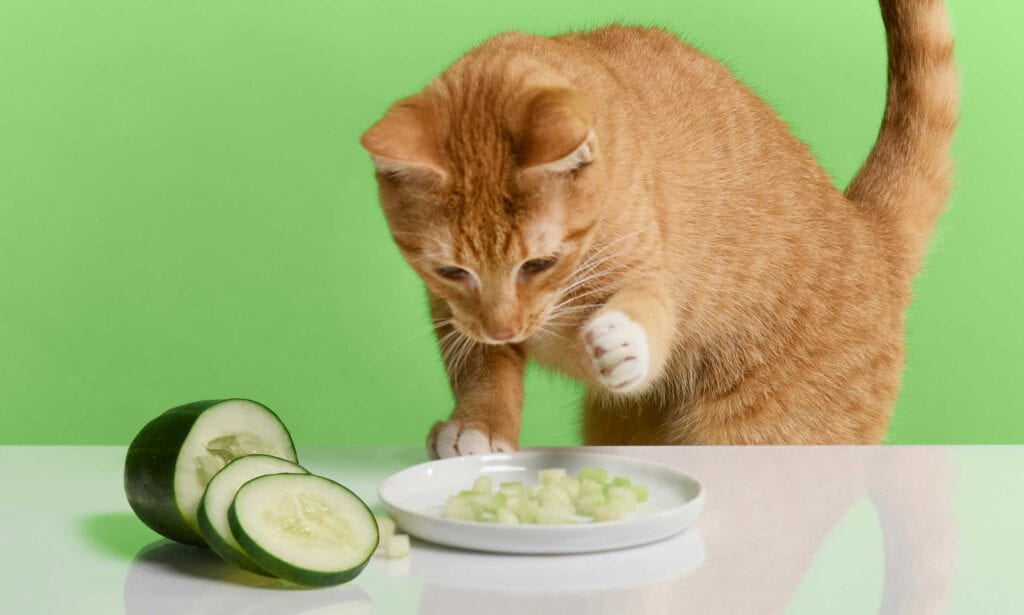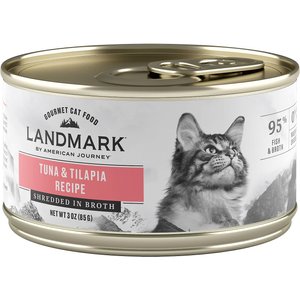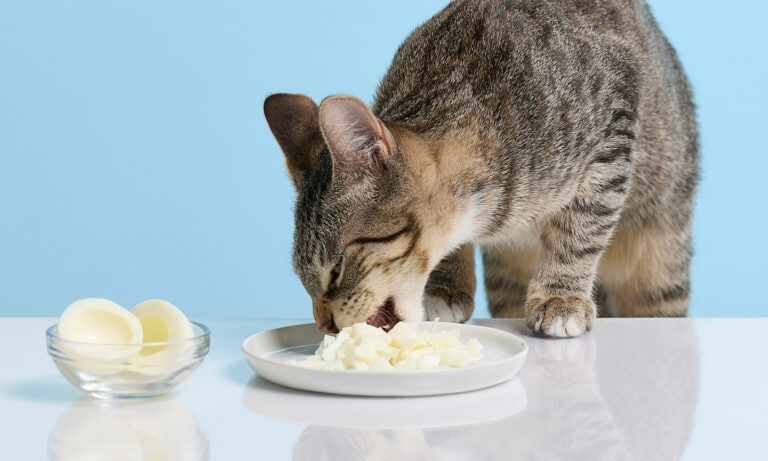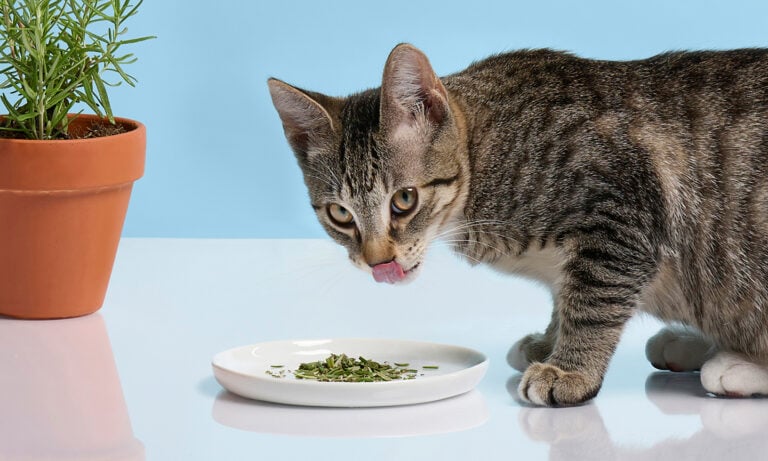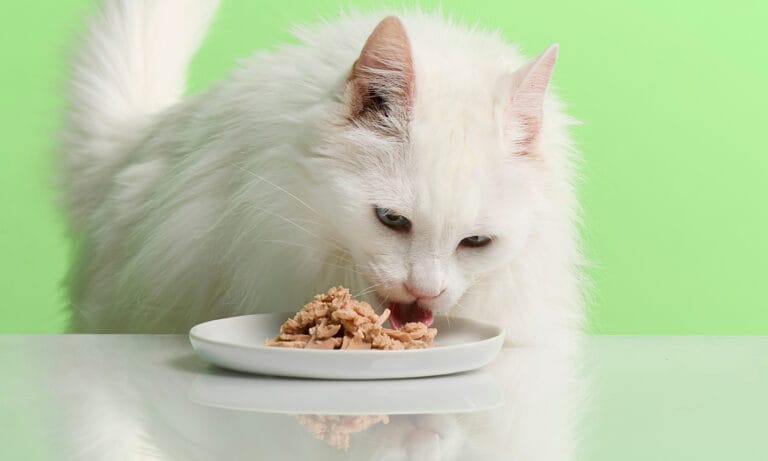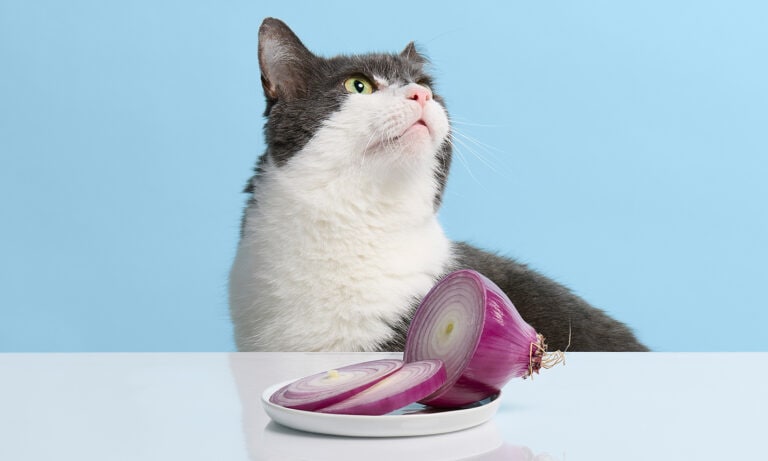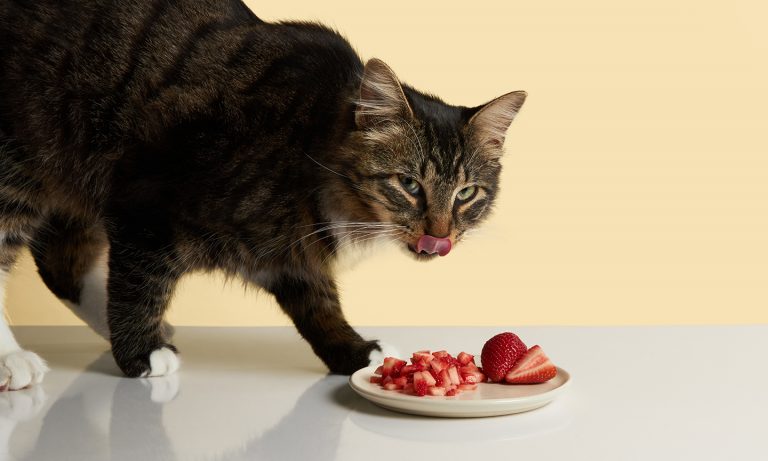Crisp and refreshing, cucumbers have long secured their spot as a versatile staple in our kitchens, gracing everything from salads and sandwiches to rejuvenating detox waters. Dogs can eat cucumbers, but can cats eat cucumbers, too?
Yes, they can! However, there are certain considerations for pet parents to keep in mind to ensure this crunchy snack is both a safe and enjoyable treat for their fur babies.
We spoke to a vet expert to understand the purr-ticulars about cats and cucumbers, including the benefits, risks and how to incorporate this crunchy fruit into your kitty’s diet.
Can Cats Eat Cucumbers?
Click to jump to each section.
How Much Cucumber Can My Cat Eat?
Although cucumbers are low-calorie and generally safe for cats to consume, that doesn’t mean they should become a significant portion of your cat’s diet. After all, cats are obligate carnivores, meaning the bulk of their nutrition and calories should come from animal protein.
So, how much cucumber is appropriate? A slice or two (each about a quarter-inch thick) a couple of times a week is generally considered safe for most cats.
If you’re introducing cucumbers for the first time, start with even less (one small piece) to test for allergic reactions.
A general rule of thumb when giving your cat treats or human food, including pork, is the 10 percent rule: No more than 10 percent of your cat’s daily calories should come from these items. The other 90 percent should come from well-balanced cat food.
How To Feed Cucumber to My Cat
Interested in adding a little cucumber to your cat’s dietary repertoire? Here are some creative and safe ways to feed this fruit to your feline friend.
1Offer Plain, Diced Cucumber
When serving your cat plain cucumber, avoid giving them “rounds” or “sticks,” as big pieces are a choking hazard. Instead, offer them a few pieces of plain, diced cucumber. Even if your cat isn’t interested in eating the pieces, they’ll likely have fun batting them around!
2Make a Cucumber-Tuna 'Salad'
A human favorite, your cats can enjoy a version of tuna salad too! Simply combine finely chopped cucumber with a bit of canned tuna (or a tuna-based wet cat food) and offer it to your cat as a tasty treat.
3Serve Cucumber Water
Want to give your cat a spa-like experience? Add a few small pieces of cucumber to their water bowl. This refreshing twist will certainly make your kitty feel a little bougie.
4Make a Cat-Friendly 'Lasagna'
Create a miniature “lasagna” tower by layering very thin slices of cucumber with your cat’s favorite high-quality wet food. This method turns eating into a fun and engaging activity and adds some extra hydration and nutrition to their meal.
5Cool Down With Frozen Cucumber
During warmer months, frozen cucumber pieces can serve as a refreshing and hydrating treat. Here’s what to do:
- Dice a peeled cucumber and place the pieces on a tray.
- Place the tray in the freezer.
- Once frozen (after about three hours), place the pieces in a container and store in the freezer.
- On hot days, take a few pieces of cucumber out of the freezer, allow them to thaw slightly, and serve.
6Offer Blended Cucumber
Using a blender, blend cucumber and water to create a puree. This can be served as is or added to your cat's wet food for extra hydration. This option is particularly good for senior cats or cats who are missing teeth.
Health Benefits of Cucumbers for Cats
While cucumbers might not be the first thing that comes to mind when considering nutritious additions to your cat’s diet, they do offer some health benefits worth mentioning. These include:
Hydration
Cucumbers have a very high water content (about 95 percent), making them an excellent source of hydration. This is particularly beneficial for cats who don’t tend to drink enough water on their own.
Dehydration can pose a serious risk to a cat’s health, including kidney problems and urinary tract infections. Insufficient water intake is particularly prevalent in cats who eat only dry kibble and no wet food. Offering cucumber slices on hot days or as a regular treat can provide an additional source of hydration for your cat.
Low in Calories
If you’re looking to offer your cat a guilt-free treat, cucumbers are a great choice. Low in calories and fat, they can serve as a suitable snack for cats who need to watch their weight.
High in Nutrients and Fiber
Although cats are obligate carnivores and get the bulk of their nutrients from meat, cucumbers can offer some vitamins and minerals, including:
- Vitamin K: important for blood clotting and liver health
- Vitamin C: an antioxidant that supports the immune system and overall health
- Molybdenum: a trace mineral that supports a cat’s metabolism
- Magnesium: plays a role in various bodily functions, including muscle and nerve function, blood glucose control, and blood pressure regulation
- Potassium: helps regulate blood pressure and maintain proper muscle and nerve function
Cucumbers (particularly the skin) also contain fiber, which, in small quantities, can aid in digestion and help relieve occasional constipation.
With that said, keep in mind that if you are feeding your cat a high-quality cat food, they will already be getting all the daily nutrients they need.
Dental Health
The crunchy texture of cucumber can help scrape off minor plaque from your cat’s teeth. However, cucumbers are not a substitute for regular dental care, which should include brushing and occasional professional cat dental cleanings.
Risks of Feeding Cucumber to Cats
There are some risks and considerations to keep in mind when giving your cat cucumber. Here’s what to watch out for:
- Choking hazard: Large chunks or pieces of cucumber can pose a choking hazard to cats. Always cut the cucumber into small, manageable pieces that are easy for your cat to chew and swallow.
- Pesticides: Non-organic cucumbers have pesticides on their skin. Consider using organic cucumbers or peeling non-organic cucumbers to mitigate this risk. Whether or not a cucumber is organic, always wash it well before giving any of it to your cat.
- Digestive issues: Cucumbers, particularly the peel, are relatively high in fiber—a substance that a cat’s digestive system is not designed to process in large amounts. Feeding your cat too much cucumber could lead to digestive problems such as mild diarrhea or an upset stomach.
- Seasonings: Many seasonings are harmful or even toxic to cats. Garlic and onion, for example, can cause life-threatening anemia, while excessive salt can cause salt poisoning. Always serve cucumber plain.
- Allergic reaction: Though rare, cats can be allergic to any food, and cucumbers are no exception. If you notice symptoms like itching, swelling or difficulty breathing after feeding cucumber to your cat, seek immediate veterinary care.
FAQs About Cucumbers and Cats
Q:
Can kittens eat cucumbers?
Q:
Are cucumber plants toxic to cats?
Q:
Can cats have cucumber skin?
A:Yes, cats can eat cucumber skin; however, the skin of the cucumber is higher in fiber compared to the inner flesh. A cat’s digestive system is not well-equipped to handle large amounts of fiber, so eating too much can lead to digestive problems like diarrhea or an upset stomach.
Additionally, the skin of non-organic cucumbers can contain pesticides, so always thoroughly wash or peel non-organic cucumbers before serving pieces to your cat.
Q:
Can cats eat pickled cucumbers?
Q:
Why are cats afraid of cucumbers?
A:Cats are not inherently afraid of cucumbers. Some people might think they are due to viral online videos of cats being startled by cucumbers. However, cats can react similarly to other unexpected objects placed behind them while they are eating or otherwise distracted—it’s not unique to cucumbers.
Purposely scaring a cat in this way can be stressful for the kitty and is discouraged.
Other human foods cats can eat:
Share:
